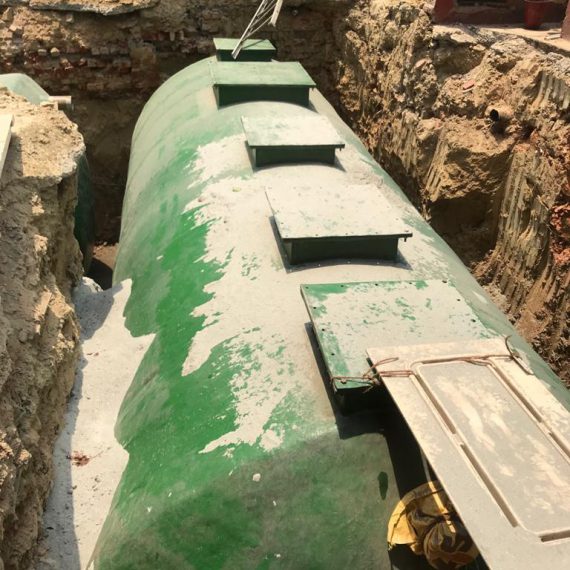UY Trienviro is always looking forward to providing cost-effective solutions to our customers.
Challenge: We were presented with a challenge to make the Sewage Treatment Plant cost-effective and low maintenance. So, we introduced an FRP-based tank to our clients to save the CAPEX cost.
FRP (Fibre Reinforced Plastic) tanks offer several benefits and are commonly used in various industries. Here are some advantages of using FRP tanks:
Corrosion Resistance: FRP tanks are highly resistant to corrosion caused by chemicals, moisture, and other environmental factors. Unlike metal tanks, they do not rust or degrade, making them suitable for storing corrosive substances such as acids, alkalis, and solvents.
Lightweight and High Strength: FRP tanks are lightweight compared to traditional materials like steel. Despite their low weight, they exhibit high strength and structural integrity. This makes them easier to transport, install, and maneuver during maintenance or relocation. For a popular 5-star hotel in Kanpur, we installed an FRP tank underground to save their precious land cost.

Design Flexibility: FRP tanks can be customized and fabricated to meet specific requirements. The manufacturing process allows for flexible design options, including different shapes, sizes, and configurations. This versatility ensures that FRP tanks can fit into various space constraints and fulfill specific application needs.
Longevity and Durability: FRP tanks are designed to have a long lifespan with minimal maintenance. They are resistant to UV radiation, weathering, and degradation over time. This makes them a cost-effective choice as they require fewer repairs and replacements compared to other materials.
Insulation Properties: FRP tanks have excellent thermal insulation properties. They can retain heat or cold efficiently, making them suitable for storing substances that require temperature control, such as chemicals or food products.
Chemical Compatibility: FRP tanks are compatible with a wide range of chemicals, making them suitable for diverse industries such as water treatment, chemical processing, and wastewater management. The material can be formulated to resist specific chemicals, ensuring safe and secure storage.
Easy Maintenance: FRP tanks generally require minimal maintenance compared to other materials. They can be easily cleaned, and their smooth interior surfaces prevent the buildup of deposits, reducing the risk of contamination.
Cost-Effective: While the upfront cost of FRP tanks may be higher than some alternatives, their long-term benefits and low maintenance requirements make them cost-effective in the long run. Their durability and resistance to corrosion help avoid costly repairs and replacements.
It’s important to note that the specific benefits and suitability of FRP tanks may vary depending on the application and the quality of the tank’s construction.
Contact us for a free quote for your FRP-based Sewage Treatment Plant.


